The document summarizes business and economic news from Mongolia. It discusses several major mining and infrastructure projects, including OT helping to build infrastructure, Ivanhoe launching a $1.8 billion rights offering for Oyu Tolgoi funding, and Macquarie securing a lead role in a potential $1 billion IPO of Altain Khudur iron ore mine. It also mentions a coal mining conference addressing issues like developing industries and connecting to energy grids, and the government's plans to address needs in energy, transportation, and water resources through various public-private projects.
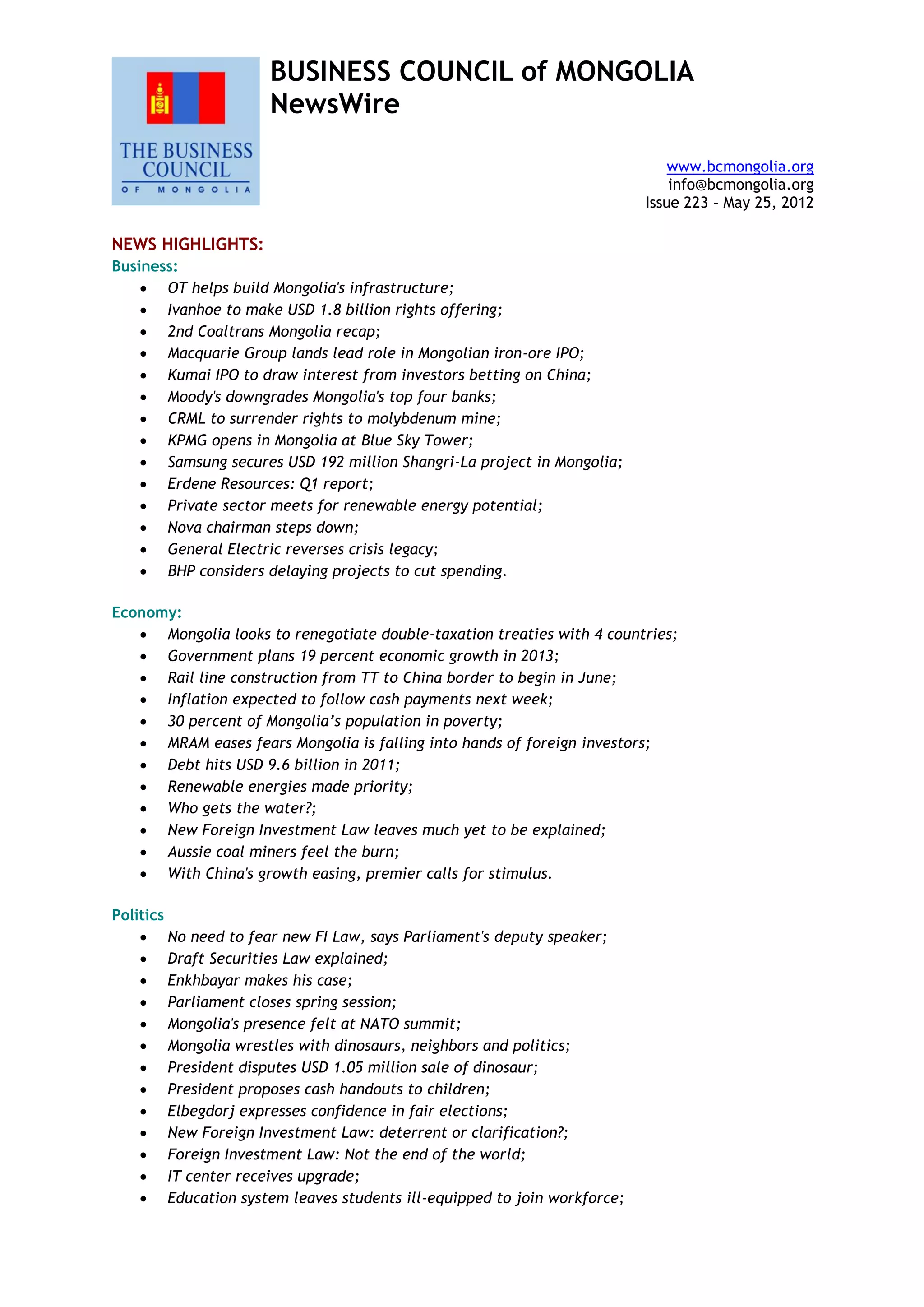

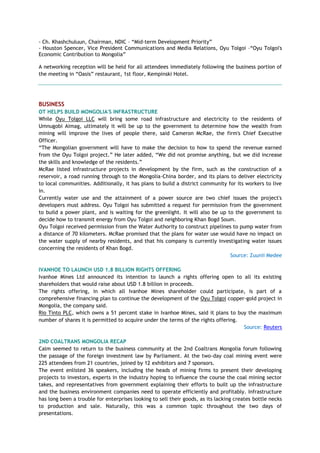
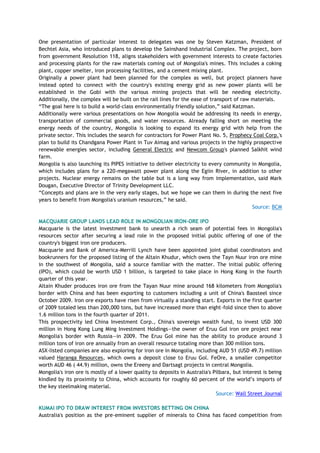
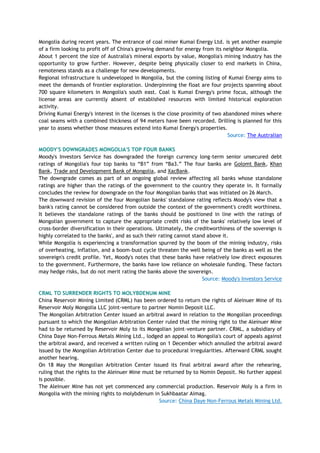
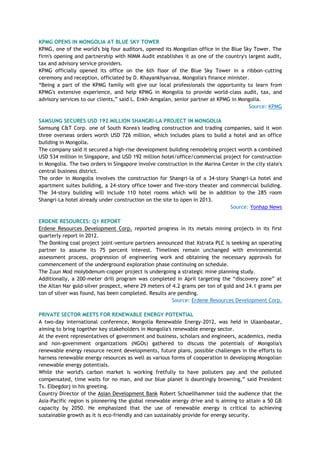
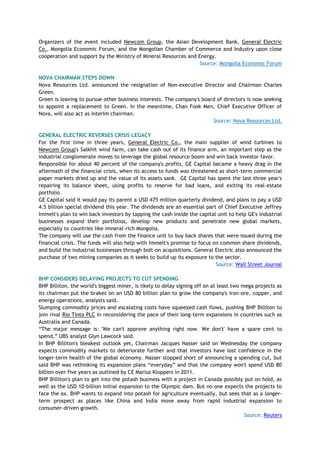
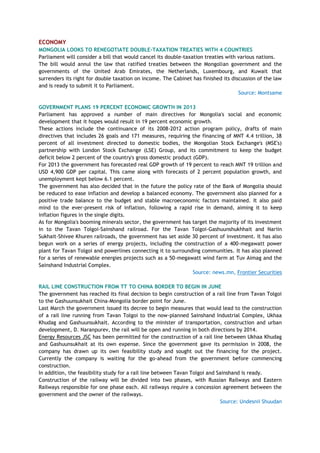
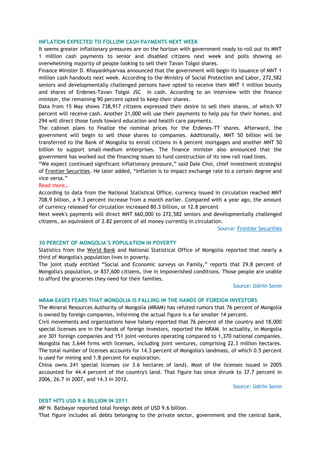
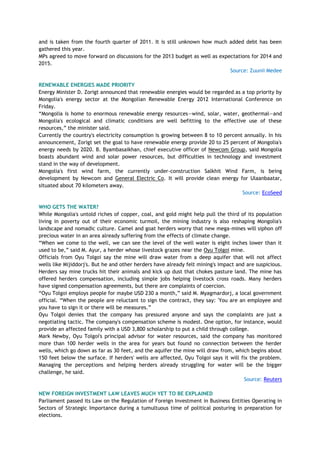
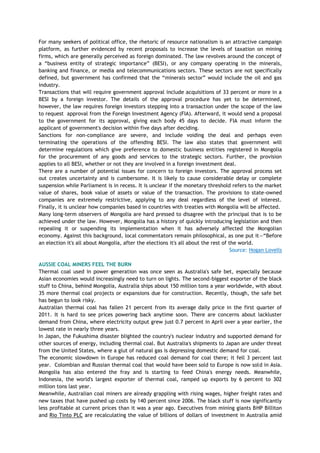
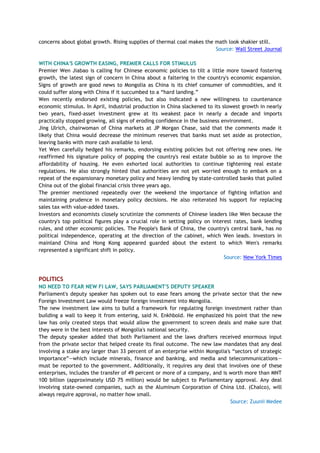
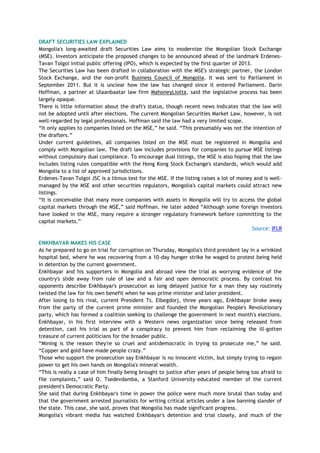
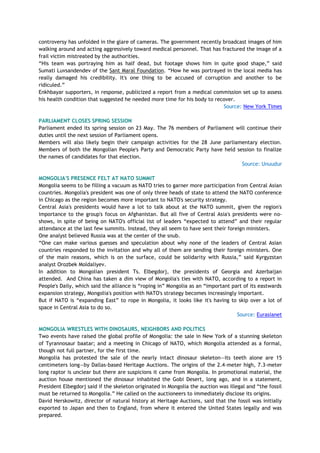
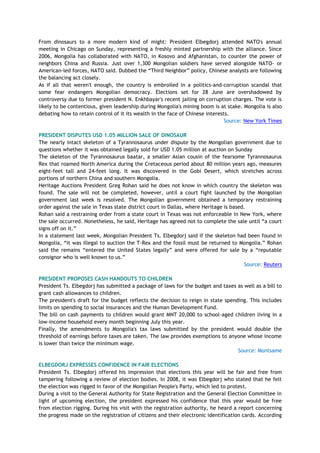
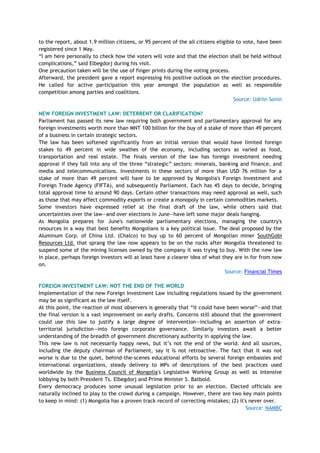
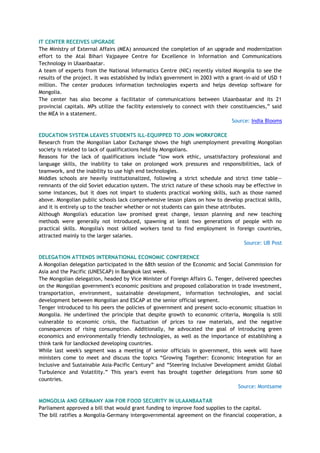
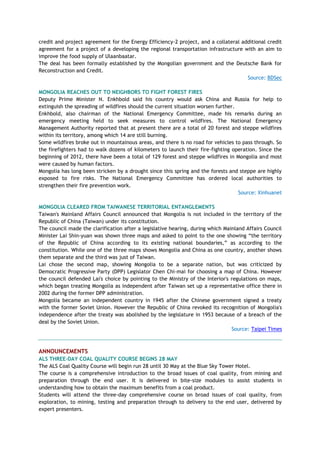
![Registration fee is USD 1,500. For more information call 343882, 99092732, or email
b.sainbileg@alsglobal.com for additional information about the course.
___________________________________________
MINExpo INTERNATIONAL 2012, LAS VEGAS, 24-26 SEPTEMBER
The Business Council of Mongolia (BCM) and the Mongolian National Mining Association (MNMA) with
the support of the U.S. Embassy‘s Commercial Section in Ulaanbaatar are now registering a
Mongolian business delegation to participate in ―MinExpo International 2012‖ which will be
organized at the Las Vegas Convention Center on September 24-26, 2012.
MinExpo International 2012 is the world's largest and most comprehensive exposition dedicated to
mining equipment, products and services. More than 1,400 exhibitors in eleven exhibit halls will
display the latest technology, equipment, components, parts and services for exploration,
extraction, safety, environmental remediation and preparation and processing of metallic ores,
coal, industrial minerals and more!
Registration deadline is 5 pm, 15 June. Please contact BCM at 70114442, tugi@bcmongolia.org or
MNMA at 314877, enkhbold@miningmongolia.mn for registration and additional information about
the event.
___________________________________________
“MM TODAY” on MNB-TV, Fridays at 18:25 [TONIGHT]
BCM is pleased to announce Mongolian National Broadcasting continues its cooperation with BCM on
―MM Today‖. This English news program is aired every Friday for 10 minutes and is scheduled for
18:30 tonight! Tune in to watch this program that reports stories from today‘s BCM NewsWire.
___________________________________________
POSTINGS ON MONGOLIAN WEBSITE „PRESENTATIONS‟ AND „NEWS‟ SECTIONS
The new ‗Presentations‘ section on BCM‘s Mongolian website which can be reached via link to
bcm.mn/itgeluud. Several presentations already posted include 9 from Coal Mongolia in February
9-10, 2012.
As a key component of BCM‘s Mongolian website ‗News‘ section, articles from the Government‘s
―Open-Government.mn‖ site are regularly posted.
___________________________________________
POSTINGS ON ENGLISH WEBSITE 'PRESENTATIONS', 'MONGOLIA REPORTS' AND „MONGOLIAN
BUSINESS NEWS‟
On BCM‘s English website, ‗Resource, Presentations‘ section, for your review are 4 presentations
from BCM‘s April 23 monthly meeting; 3 speeches from ―Corporate Governance Training for
Directors‖ on April 27-28; 12 presentations on Mongolian entities at Mines and Money Hong Kong
2012 on March 21-23; 11 presentations from Coal Mongolia 2012 on February 9-10; 7 speeches from
the Mongolian Investment Summit on December 8-9, 2011 in London; several speeches at the Risk
Management Forum on November 8 co-organized by BCM and Mandal Insurance; speeches at
Discover Mongolia 2011; and speeches from all BCM‘s monthly meetings in 2011-12.
Also on BCM‘s English website, ‗Resource, Mongolia Reports‘ section, please note the Polit
Barometer, April 2012 by Sant Maral Foundation (Mongolian and English versions); ―Preliminary
estimates of staggering costs of inefficient trade regulation in Mongolia‖ by Olin McGill, consultant
to USAID BPI; ADB‘s Asian Development Outlook, April 2012; detailed results of BCM‘s NewsWire
survey of March 2012; World Bank‘s Mongolia Quarterly Economic Update, February 2012; Executive
Summary of the Mongolian Real Estate Report 2012 by M.A.D. Investment Solutions; Mongolia –
World Bank Country Survey 2011; Welcoming remarks by Jim Dwyer, BCM at Mongolia Investment
Summit 2011 Hong Kong, Mining Journal Supplement for Mongolia, October 2011; and ―Mongolia‘s
Mining Services Cluster 2010‖, Professor Michael E. Porter, Harvard University, The Microeconomics
of Competitiveness.
We are now posting some news stories and analyses relevant to Mongolia to BCM website's](https://image.slidesharecdn.com/bcmnewswireissue223-160215125008/85/25-05-2012-NEWSWIRE-Issue-223-19-320.jpg)
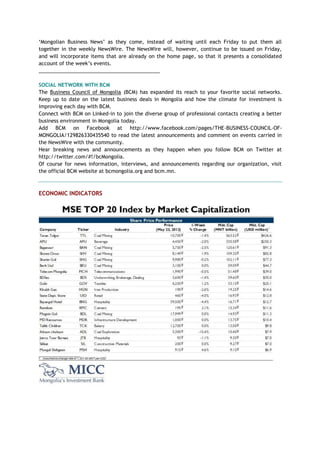
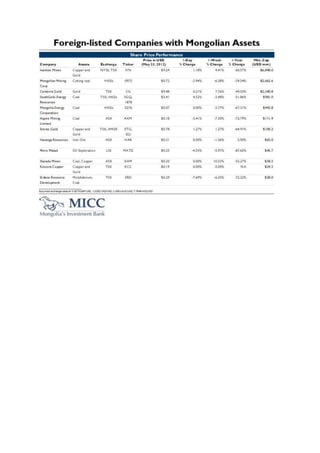
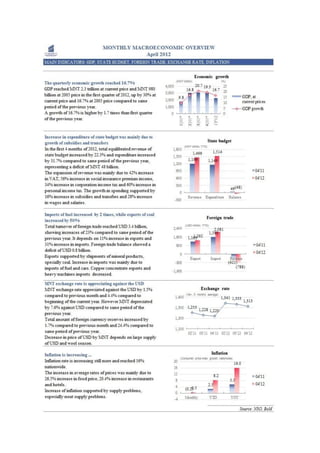
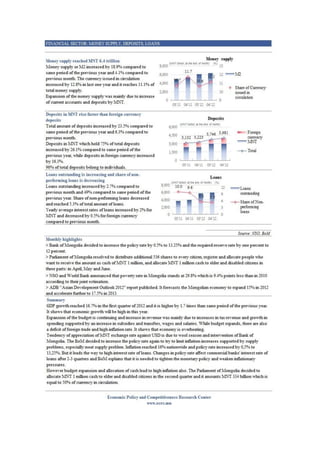
![INFLATION
Year 2006 6.0% [source: National Statistical Office of Mongolia (NSOM)]
Year 2007 *15.1% [source: NSOM]
Year 2008 *22.1% [source: NSOM]
Year 2009 *4.2% [source: NSOM]
Year 2010 *13.0% [source: NSOM]
Year 2011 *10.2% [source: NSOM]
April 30, 2012 *16.0% [source: NSOM]
*Year-over-year (y-o-y), nationwide
Note: 17.8% y-o-y, Ulaanbaatar city, April 30, 2012
CENTRAL BANK POLICY RATE
December 31, 2008 9.75% [source: IMF]
March 11, 2009 14.00% [source: IMF]
May 12, 2009 12.75% [source: IMF]
June 12, 2009 11.50% [source: IMF]
September 30, 2009 10.00% [source: IMF]
May 12, 2010 11.00% [source: IMF]
April 28, 2011 11.50% [source: IMF]
August 25, 2011 11.75% [source: IMF]
October 25, 2011 12.25% [source: IMF]
March 19, 2012 12.75% [source: Mongol Bank]
April 18, 2012 13.25% [source: Mongol Bank]
CURRENCY RATES – May 24, 2012
Currency Name Currency Rate
U.S. dollar USD 1,320.64
Euro EUR 1,655.82
Japanese yen JPY 16.62
British pound GBP 2,066.27
Hong Kong dollar HKD 170.11
Chinese yuan CNY 208.19
South Korean won KRW 1.13
Russian ruble RUB 41.62
Disclaimer: Except for reporting on BCM‘s activities, all information in the BCM NewsWire is
selected from various news sources. Opinions are those of the respective news sources.](https://image.slidesharecdn.com/bcmnewswireissue223-160215125008/85/25-05-2012-NEWSWIRE-Issue-223-24-320.jpg)